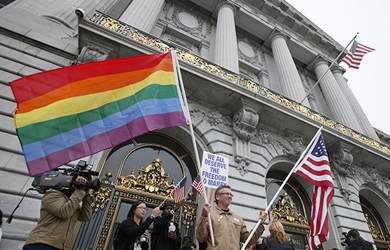No, former National Review columnist John Derbyshire hasn’t seen 12 Years a Slave, but he knows it is a bad movie because it is unfair to the poor, persecuted and maligned slave-owners of the antebellum South. In his latest racist column, Derbyshire calls 12 Years a Slave “Abolitionist Porn” and chides the film for not including what he sees as the happier instances of slavery, such as one slaveholder who only doled out beatings “once in a while.”
“Plainly there was more to American race slavery that white masters brutalizing resentful Negroes,” Derbyshire writes. “Slavery is more irksome to some than to others; and freedom can be irksome, too.”
Derbyshire compares slavery in the US to the communist system in China, saying that “while there was much grumbling, and some scattered seething rebelliousness, most Chinese got along with the system. A lot of people were very happy with it.”
“In the matter of slavery, though, I already feel sure that the shallow good North, bad South simplicities of Abolitionist Porn and popular perception bear little relation to the thorny tangles of reality,” he concludes.
It seems I’ve picked up an interest in the Civil War just as America is undergoing a revival of Abolitionist Porn. That, at any rate, is what I take this much-talked-of new movie 12 Years a Slave to be.
No, I haven’t seen the thing, but I’ve read reviews. Also I’ve seen (and reviewed) a specimen of the allied genre: Civil Rights Porn.
And I’ve no doubt there was such a thing as Abolitionist Porn. It would have been surprising if there wasn’t. Whenever there’s a deep and long-standing difference between two sets of social principles, a genre of lurid tales will come up in one camp, denigrating the other.
…
The Slave Narratives are recorded reminiscences from ex-slaves, gathered by the Federal Writers’ Project in 1936-38. The speaker here was born “around 1852”:
Mars George fed an’ clo’esed well an’ was kin’ to his slaves, but once in a while one would git onruly an’ have to be punished. De worse I ever seen one whupped was a slave man dat had slipped off an’ hid out in de woods to git out of wuk. Dey chased him wid blood hounds, an’ when dey did fin’ him dey tied him to a tree, stroppin’ him ’round an’ ’round. Dey sho’ did gib him a lashin’.
[Mississippi Slave Narratives , Harriet Walker.]
As that extract illustrates, though, the Slave Narratives also remind us how remarkably often ex-slaves spoke well of their masters.
Plainly there was more to American race slavery that white masters brutalizing resentful Negroes. How much more, though? What was slavery actually like?
…
People are born, raised, educated, and find themselves in a certain kind of society to which those around them are all accustomed. American slave society was a way of life; a settled way that most people took for granted, as most people will anywhere.
There were aspects of life resembling slavery in the communist China where I lived, 1982-3. People had no liberty to find their own employment. You were “assigned” to a “unit.” If unhappy there, it was a devil of a job to get re-assigned.
Families broken up? One of my Chinese colleagues lived alone because his wife was “assigned” to a distant province. He only saw her once a year.
The guy drank a lot.
Yet while there was much grumbling, and some scattered seething rebelliousness, most Chinese got along with the system. A lot of people were very happy with it. You didn’t have to think much, or take much responsibility. And that suits many of us just fine.
…
Slavery is more irksome to some than to others; and freedom can be irksome, too. Personally, I’d be a terrible slave—too ornery. I know people, though—and I’m talking about white people—who I quietly suspect would be happy in slavery.
…
In the matter of slavery, though, I already feel sure that the shallow good North, bad South simplicities of Abolitionist Porn and popular perception bear little relation to the thorny tangles of reality.








